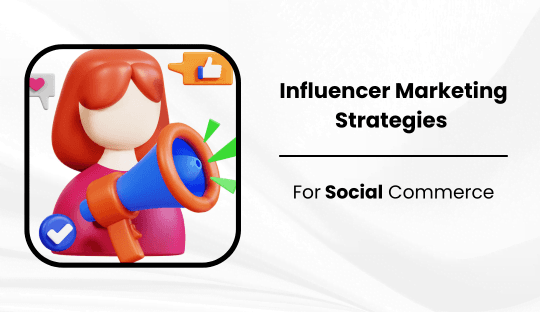
Influencer Marketing Strategies for Social Commerce
In the rapidly evolving digital landscape, influencer marketing has become a cornerstone of social commerce, driving brand awareness, engagement, and sales. Flykez CO, a creative brand company in Canada specializing in website design, SEO, brand identity, and digital marketing, can harness the power of influencer marketing to enhance its social commerce strategy. This blog post explores effective influencer marketing strategies that can elevate your social commerce efforts.
The Role of Influencer Marketing in Social Commerce
Influencer marketing leverages the reach and credibility of influencers to promote products and services, driving consumer decisions directly through social media platforms. This approach not only boosts visibility but also builds trust and authenticity, which are crucial for converting followers into customers.
Key Strategies for Effective Influencer Marketing in Social Commerce
- Identify the Right Influencers:
- Research and Selection: Choose influencers whose audience aligns with your target market. Look for influencers with a high engagement rate rather than just a large follower count. Tools like BuzzSumo and HypeAuditor can help identify influencers who match your brand values and target demographics.
- Focus Keywords: Influencer Marketing, Instagram Influencers, Blog Influencers
- Build Authentic Relationships:
- Long-Term Partnerships: Develop long-term relationships with influencers rather than one-off collaborations. This approach fosters authenticity and trust, making endorsements more genuine and impactful.
- Focus Keywords: Brand Partnerships, Influencer Collaboration
- Leverage Different Content Formats:
- Diversify Content: Use a mix of content formats such as Instagram posts, Stories, Reels, and blog posts. Incorporate video content, which has a higher engagement rate and is particularly effective for demonstrating product use.
- Focus Keywords: Instagram Influencers, Engagement Rate
- Incorporate Live Shopping:
- Real-Time Engagement: Use live shopping features on platforms like Instagram and Facebook. Live sessions allow influencers to showcase products in real-time, answer questions, and provide immediate purchasing opportunities, enhancing the shopping experience.
- Focus Keywords: Live Shopping with Influencers, Social Commerce
- Utilize User-Generated Content (UGC):
- Amplify Authenticity: Encourage influencers to generate content featuring your products and share it with their followers. UGC provides social proof and can be repurposed across your brand’s social media channels. Also Read About Navigating Pay Transparency in Influencer Marketing
- Focus Keywords: Influencer Marketing, Influencer Collaboration
- Track and Analyze Performance:
- Measure Impact: Use analytics tools to track the performance of influencer campaigns. Monitor metrics such as engagement rates, reach, impressions, and conversion rates to assess the effectiveness of your strategies.
- Focus Keywords: Engagement Rate, Influencer Marketing Best Practice
- Ensure Transparent Communication:
- Clear Expectations: Set clear expectations regarding deliverables, timelines, and compensation. Transparency helps build trust and ensures that both parties are aligned on the campaign objectives.
- Focus Keywords: Influencer Marketing Best Practice, Brand Partnerships
- Leverage Social Proof:
- Testimonials and Reviews: Encourage influencers to share their honest reviews and testimonials. Authentic endorsements from trusted voices can significantly influence purchasing decisions.
- Focus Keywords: Influencer Marketing, Instagram Influencers
Implementing Influencer Marketing Campaigns
- Campaign Planning:
- Define Goals: Establish clear goals for your influencer marketing campaign, such as increasing brand awareness, driving traffic to your website, or boosting sales.
- Identify KPIs: Key performance indicators (KPIs) should be set to measure the success of the campaign. These may include engagement rate, follower growth, and conversion rate.
- Focus Keywords: Influencer Marketing Best Practice, Engagement Rate
- Content Creation:
- Collaborate on Content: Work closely with influencers to create content that aligns with your brand’s messaging and aesthetics. Allow influencers creative freedom to maintain authenticity.
- Repurpose Content: Repurpose influencer content for use in other marketing channels such as email newsletters, ads, and your brand’s social media profiles.
- Focus Keywords: Influencer Collaboration, Blog Influencers
- Monitoring and Optimization:
- Real-Time Adjustments: Continuously monitor the performance of the influencer campaign and make adjustments as needed. This may involve tweaking content, changing posting schedules, or adjusting promotional tactics.
- Data-Driven Decisions: Use the data collected to inform future campaigns, ensuring continuous improvement and better ROI.
- Focus Keywords: Influencer Marketing Best Practice, Engagement Rate
Conclusion
Influencer marketing is a powerful strategy for driving social commerce, offering an authentic way to connect with potential customers and boost sales. By identifying the right influencers, building authentic relationships, leveraging various content formats, and incorporating live shopping, Flykez CO can enhance its social commerce strategy. Regularly tracking performance and maintaining transparent communication are essential for achieving long-term success in influencer marketing.
For more information on how Flykez CO can help you implement effective influencer marketing strategies, visit www.flykez.com.
